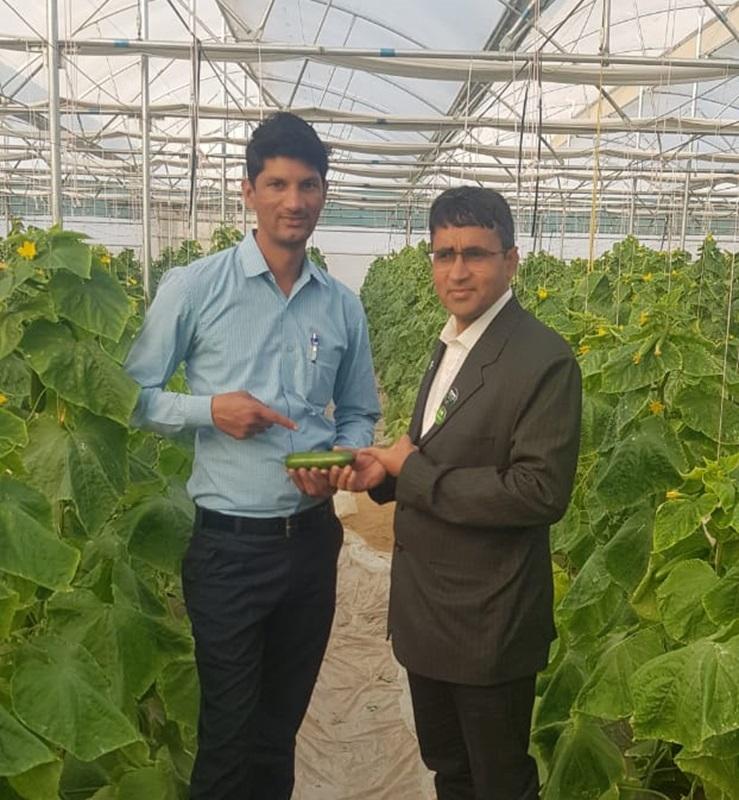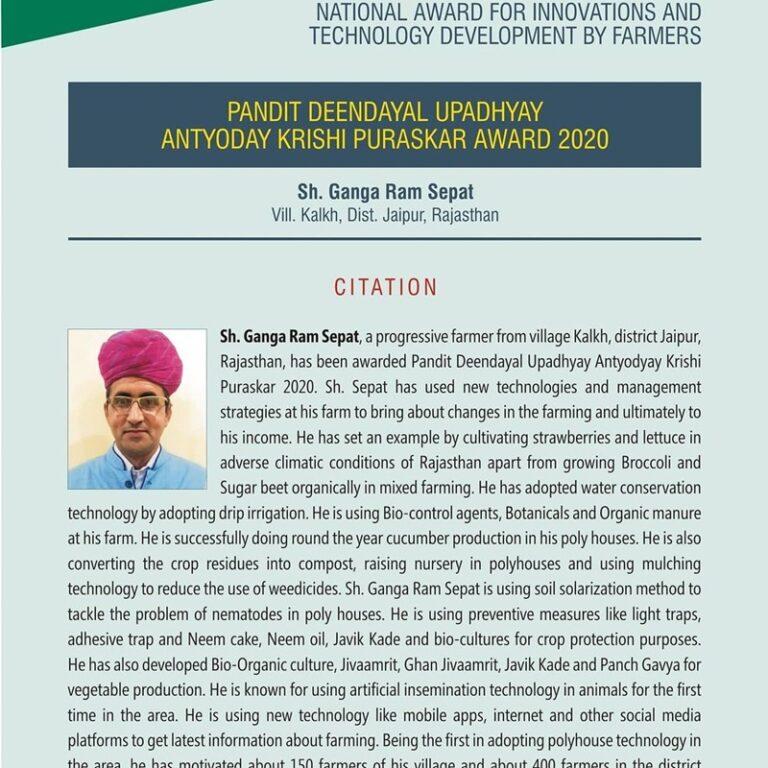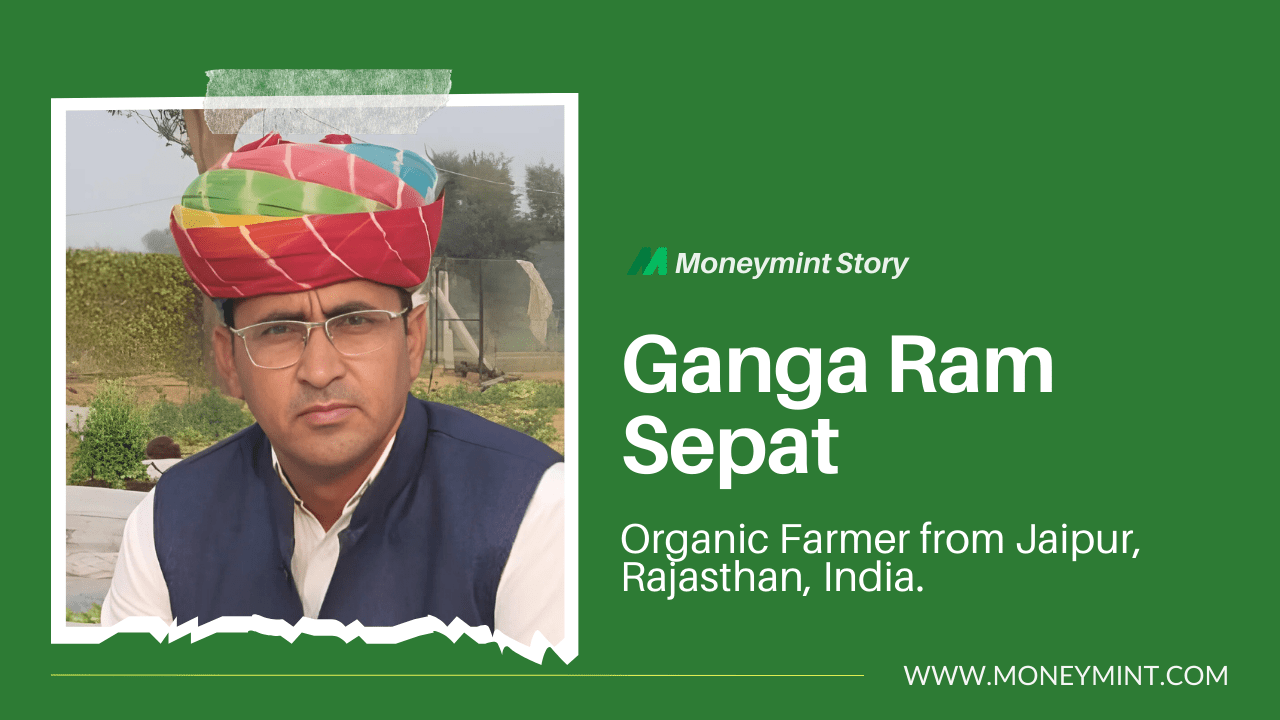Ganga Ram Sepat, a farmer from Kalakh village, Phulera, Jaipur, has transformed his barren fields through organic farming and sustainable practices.
Ganga Ram Sepat was always passionate about agriculture, so when he enrolled in college, he decided to pursue a degree in botany, zoology, and chemistry at the government Shakambhar College at Sambhar Lake and graduated in 1998. After completing his degree he founded a private school in his village.
A New Beginning After College
After completing his education, he wanted to open a school to reduce unemployment. Quality education can help kids with better opportunities in the future.
But later, his focus shifted towards agriculture. He heard about Khema Ram, a farmer who grows food in a polyhouse. Khema was a neighbor of his friend; he visited the Khema farm. From there, he got to know about polyhouses. To learn more about polyhouses and soil solarisation, Ganga visited the International Horticulture Innovation and Training Centre (IHITC) in Jaipur. Here he did his training for three days.
After doing his training, in October 2017, he set up his first-ever three-acre polyhouse, where he grows cucumber and earns around Rs 30 lakh yearly.
He plants over 7,500 seeds. Not just this, in his six-acre farmland, he also cultivates numerous other organic crops like sweet corn, broccoli, tomatoes, strawberries, wheat, okra, iceberg lettuce, and chili.
The Eureka Moment
Initially, Ganga Ram Sepat grew traditional crops like bajra, jawar, maize, and wheat on his family’s six-acre land.
But in 2013, things changed when he learned about the harmful effects of pesticides and chemicals and how the heavy use of chemicals in traditional farming raises the cases of cancer in rural Punjab.
He understood the present practices were affecting the soil quality, production, and the health of the farmer. He felt an urgent need to change his farming ways. Thus, he completely gave up on insecticides and fungicides.
Setting Up Polyhouse

In his 4 hectares of land, he cultivates cucumbers within polyhouses while minimizing the use of pesticides.
To counteract insects and disease proliferation, he employs biorational chemicals and biocultures like Pseudomonas and Trichoderma. Also, he uses Bioagents like Beauveria and Metarizium Enisoply to protect crops.
Ganga Ram grows exotic veggies like red cabbage, China cabbage, broccoli, lettuce, along with cucumber. Since his village faces water shortage, and to address this he built a farm pond. This pond can hold around 1 crore liters of water.
Tackling the Challenge of Pest Control
Ganga Ram reveals that soil solarisation is an effective method for pest control. It can reduce the risk of fungal disease, nematodes, and weeds that harm plants. According to Ganga Ram, polyhouse growers’ biggest concern is nematodes attacking the roots, making colonies, and depriving the plant’s capacity to absorb nutrition.
To overcome this, he uses sampurna jaivik kadha (neem oil and natural bio-cultures) along with organic manures.
Inspiring Other Farmers
His innovative techniques of growing cucumber have inspired other farmers like Babulal Mahariya. He was initially growing bajras and wheat but shifted to natural methods and now grows toxin-free cucumbers in a polyhouse.
Awards and Achievements

Ganga Ram’s contributions to organic farming earned him recognition and awards like Millionaire Horticulture Farmer of India at the national level of cucumber cultivation by Krishi Jagran, the JB Kheti award at the state level in 2019, and the IARI Fellow award in 2022.
In addition to cucumber cultivation, he also has a fish pond where he has cultures of Rohu and Katla fish. Ganga Ram has decided to expand his farming venture by growing mushrooms. He also heard of hydroponics, and now he is eager to explore this farming technique. Ganga Ram encourages University students, to visit his farm to learn about the polyhouses and other methods.
Picture Credits: Ganga Ram Sepat (Twitter) and Ganga Ram Sepat




